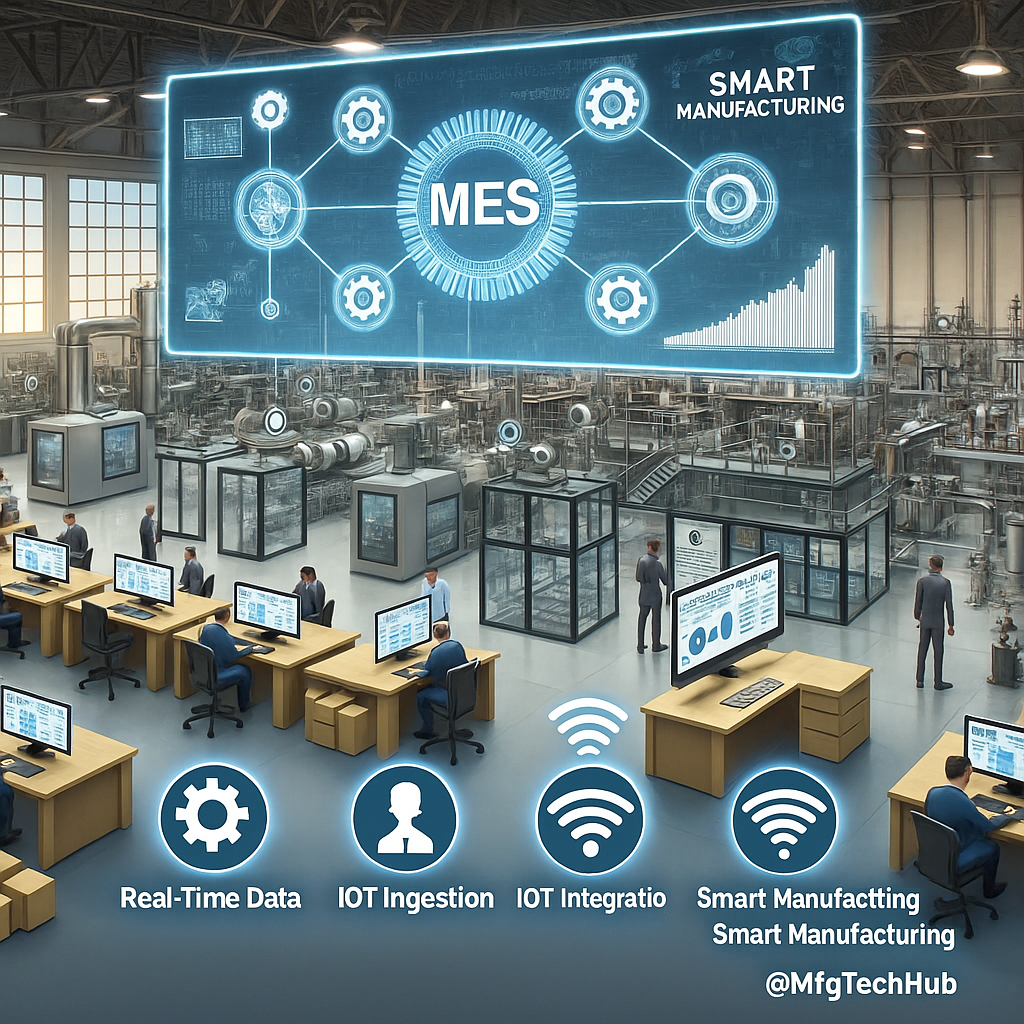MES References: Books and Articles
Manufacturing Execution Systems (MES) are at the heart of modern manufacturing operations. They provide real-time visibility, improve process control, and bridge the gap between enterprise-level planning systems (ERP) and the shop floor. But mastering MES requires more than hands-on experience — it demands a solid foundation of knowledge from trusted sources. That’s where MES References come in.
Whether you are an automation engineer, a plant manager, a systems integrator, or a student entering the world of Industry 4.0, this guide compiles the most valuable MES References available today. We’ll cover essential books, insightful research articles, and real-world case studies — along with guidance on how to use these resources effectively.

1. Why MES References Are Essential
Implementing MES is complex. It involves technical integration with automation systems like PLCs and SCADA, adherence to industry standards such as ISA-95, alignment with production goals, and coordination across multiple departments. Without reliable MES References, decision-makers risk costly implementation mistakes, inefficient workflows, or underutilized systems.
High-quality MES References help you:
- Understand MES architecture, functions, and modules (production, quality, inventory, maintenance).
- Stay updated on integration methods with ERP, IoT, and AI-based manufacturing analytics.
- Learn best practices to improve OEE, reduce downtime, and meet compliance requirements.
- Gain inspiration from real-world case studies and lessons learned by other manufacturers.
2. MES References – Recommended Books
Books are among the most reliable MES References because they provide structured, in-depth coverage. The list below contains 15 top books covering MES fundamentals, integration strategies, quality management, and digital transformation topics. Each one includes a direct link so you can learn more or purchase it.
| S.No | Book Title | Author(s) | Link |
|---|---|---|---|
| 1 | Manufacturing Execution Systems: An Operations Management Approach | Grant Vokey & Roland Jakubowski | Amazon |
| 2 | Smart Manufacturing: The Lean Six Sigma Way | Anthony Tarantino | Amazon |
| 3 | Manufacturing Execution Systems: Business Strategies and Technologies | Michael McClellan | Amazon |
| 4 | Manufacturing Execution Systems: Principles and Practice | Heiko Meyer, Thomas Sommer | Amazon |
| 5 | Automation, Production Systems, and Computer-Integrated Manufacturing | Mikell P. Groover | Amazon |
| 6 | The Digital Transformation of Industry | Ulrich Sendler | Springer |
| 7 | MES Guide for Executives | Bianca Scholten | ISA |
| 8 | MES: A Comprehensive Guide | Raffaello Lepratti | Springer |
| 9 | Operations Management in Manufacturing Systems | Alberto Portioli-Staudacher | Amazon |
| 10 | Industry 4.0: The Industrial Internet of Things | Alasdair Gilchrist | Apress |
| 11 | Manufacturing Intelligence for Industrial Engineering | Yingfeng Zhang | Springer |
| 12 | ISA-95 Implementation Experiences | Various Authors | ISA |
| 13 | Lean Manufacturing and the MES Connection | Michael McClellan | Amazon |
| 14 | Industrial Automation and Control System Security for Engineers | Philip A. Craig | CRC Press |
| 15 | MES and Quality Management Integration | Industry Experts | Quality Digest |
These books provide a blend of theory and practice, from understanding MES architecture to integrating quality systems and applying lean principles. Beginners should start with foundational texts like Manufacturing Execution Systems: An Operations Management Approach, while professionals looking for strategic insights should explore MES Guide for Executives.
3. MES References – Research Articles & White Papers
In a rapidly changing field like MES, books can’t always keep pace with emerging trends. This is where research articles and white papers become essential MES References. They provide timely insights into technology shifts, best practices, and experimental applications.
| S.No | Title | Source | Link |
|---|---|---|---|
| 1 | The Role of Manufacturing Execution Systems (MES) in Industry 4.0 | ResearchGate | Read |
| 2 | MES: The Key to Optimizing Production in the Digital Age | Manufacturing Engineering | Read |
| 3 | Optimizing Manufacturing with MES | IndustryWeek | Read |
| 4 | MES Implementation Best Practices | Automation World | Read |
| 5 | How MES Integrates with AI and IoT | ARC Advisory Group | Read |
| 6 | Cloud-Based MES – Benefits and Risks | Control Engineering | Read |
| 7 | Using MES to Improve Supply Chain Visibility | Manufacturing.net | Read |
| 8 | MES Cybersecurity Challenges | ISA.org | Read |
These papers provide guidance on emerging areas such as cloud MES adoption, cybersecurity, and AI-driven production optimization — topics that are increasingly relevant to modern MES users.
4. MES References – Real-World Case Studies
Case studies offer the most practical MES References because they show real-world challenges, solutions, and measurable results. By examining these examples, you can better plan your own MES projects.
- Siemens Opcenter at General Motors – Boosted scheduling efficiency and improved quality control.
- Nestlé with Honeywell MES – Enhanced traceability, compliance, and efficiency in food manufacturing.
- Pharmaceutical MES by Rockwell Automation – Achieved GMP compliance and streamlined production with electronic batch records.
5. Best Practices for Using MES References
To get the most from these MES References:
- Begin with foundational books for structured understanding.
- Use recent articles to keep up with evolving technologies and standards.
- Review case studies to understand practical challenges and solutions.
- Apply lessons in small pilot projects before full-scale rollout.
6. Conclusion
Building your MES expertise requires a combination of structured learning, timely updates, and practical insights. The MES References provided here — from books to research papers and case studies — will give you a comprehensive learning path. With the right knowledge, you can design, implement, and optimize MES solutions that drive operational excellence in the Industry 4.0 era.
For a deeper starting point, explore our MES Introduction guide, then return to this page to expand your MES learning library.
